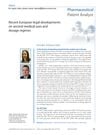 68 citations,
June 2005 in “Expert Opinion on Therapeutic Targets”
68 citations,
June 2005 in “Expert Opinion on Therapeutic Targets” Oestrogens help maintain healthy skin, heal wounds, and may protect against skin aging and cancer.
[object Object]  6 citations,
April 2019 in “Endocrinology and Metabolism Clinics of North America”
6 citations,
April 2019 in “Endocrinology and Metabolism Clinics of North America” Testosterone therapy for transmasculine individuals is generally safe with medical supervision, improves mental health, and has mixed effects on physical health.
 November 2020 in “Elsevier eBooks”
November 2020 in “Elsevier eBooks” Antiandrogens and androgen inhibitors like spironolactone, finasteride, and dutasteride can treat hair loss and skin conditions, but they have risks and side effects, including potential harm to pregnant women and risks of cancer and heart issues. Herbal remedies also have antiandrogenic effects but lack safety validation.
 24 citations,
September 2001 in “Journal of The American Academy of Dermatology”
24 citations,
September 2001 in “Journal of The American Academy of Dermatology” Women's ovarian hormones and adrenal androgens change throughout life, affecting hair loss and health.
 37 citations,
February 2013 in “Maturitas”
37 citations,
February 2013 in “Maturitas” Testosterone therapy is beneficial for women's health and does not cause masculinization or liver damage, and it protects the heart and breasts.
 September 2016 in “Elsevier eBooks”
September 2016 in “Elsevier eBooks” Different types of hair loss in dogs and cats have various causes and treatments, with outcomes ranging from good to uncertain.
 January 2016 in “Springer eBooks”
January 2016 in “Springer eBooks” The document concludes that there are various causes and treatments for hair loss, with hair transplantation being a notable option.
1 citations,
February 2024 in “Pharmaceutics” Nanovesicles improve drug delivery through the skin, offering better treatment outcomes and fewer side effects.
 38 citations,
September 2014 in “Cell and Tissue Research”
38 citations,
September 2014 in “Cell and Tissue Research” The hair follicle infundibulum plays a key role in skin health and disease, and understanding it better could lead to new skin disease treatments.
 68 citations,
December 2014 in “Cell Biochemistry and Function”
68 citations,
December 2014 in “Cell Biochemistry and Function” Nuclear hormone receptors play a significant role in skin wound healing and could lead to better treatment methods.
 November 2009 in “Journal of Pediatric Nursing”
November 2009 in “Journal of Pediatric Nursing” Nonclassic congenital adrenal hyperplasia is a common genetic disorder that can cause a range of symptoms and requires personalized treatment.
 85 citations,
June 2006 in “Best Practice & Research Clinical Endocrinology & Metabolism”
85 citations,
June 2006 in “Best Practice & Research Clinical Endocrinology & Metabolism” The document concludes that hirsutism is the main sign for diagnosing hyperandrogenism, which requires a detailed patient history and physical exam.
 September 2023 in “Curēus”
September 2023 in “Curēus” Reproductive hormones play a crucial role in breast cancer development and treatment challenges.
 25 citations,
November 2001 in “Kidney International”
25 citations,
November 2001 in “Kidney International” Male hormones worsen kidney transplant damage, but blocking them helps.
May 2023 in “MQRInvestigar” A young dog with an enlarged prostate and cysts improved significantly after treatment and surgery.
 March 2016 in “Reactions Weekly”
March 2016 in “Reactions Weekly” Post-finasteride syndrome causes various symptoms in men using finasteride, with no known cure.
 2 citations,
September 2012 in “Pharmaceutical patent analyst”
2 citations,
September 2012 in “Pharmaceutical patent analyst” European patent law now allows patents for new uses and dosages of known drugs, but protection scope is unclear.

Men with early balding may have a higher risk of prostate issues, and surgery for prostate cancer has a slight survival benefit over radiation.
 40 citations,
April 1999 in “Drugs”
40 citations,
April 1999 in “Drugs” Finasteride treats enlarged prostate, improves urinary flow, but may cause sexual side effects.
 1 citations,
April 2019 in “Clinical Breast Cancer”
1 citations,
April 2019 in “Clinical Breast Cancer” Medicines for enlarged prostate may raise the risk of breast growth and tenderness but not breast cancer.
 70 citations,
November 2013 in “The BMJ”
70 citations,
November 2013 in “The BMJ” Tamsulosin for enlarged prostate may increase the risk of severe low blood pressure, especially when starting or restarting the medication.
 14 citations,
November 2006 in “Current Medicinal Chemistry”
14 citations,
November 2006 in “Current Medicinal Chemistry” New treatments for enlarged prostate are being developed to be more effective and have fewer side effects.
 20 citations,
June 2017 in “Hormone Molecular Biology and Clinical Investigation”
20 citations,
June 2017 in “Hormone Molecular Biology and Clinical Investigation” Long-term use of dutasteride for enlarged prostate may worsen blood sugar, cholesterol, and erectile dysfunction.
16 citations,
January 2019 in “Pharmaceutical biology” Lespedeza cuneata extract may help treat enlarged prostate.
[object Object]  3 citations,
January 2001 in “Cambridge University Press eBooks”
3 citations,
January 2001 in “Cambridge University Press eBooks” Finasteride effectively treats hair loss and enlarged prostate in men, with mild side effects.
 22 citations,
October 2019 in “International Journal of Nanomedicine”
22 citations,
October 2019 in “International Journal of Nanomedicine” The nanoparticles improved hair growth and enlarged hair bulbs.
 19 citations,
October 2018 in “PLOS ONE”
19 citations,
October 2018 in “PLOS ONE” 5 alpha-reductase inhibitors can slightly improve symptoms of enlarged prostate but have a high risk of sexual side effects.
 8 citations,
December 2011 in “Journal of Medicinal Food”
8 citations,
December 2011 in “Journal of Medicinal Food” D-004 may be a natural alternative to finasteride for treating enlarged prostate and male baldness.
 20 citations,
October 2018 in “Clinical Drug Investigation”
20 citations,
October 2018 in “Clinical Drug Investigation” Dutasteride does not impair mental function in elderly men with enlarged prostate.
 1054 citations,
February 1998 in “The New England Journal of Medicine”
1054 citations,
February 1998 in “The New England Journal of Medicine” Finasteride reduces urinary issues and surgery need in men with enlarged prostates by over 50%.



























